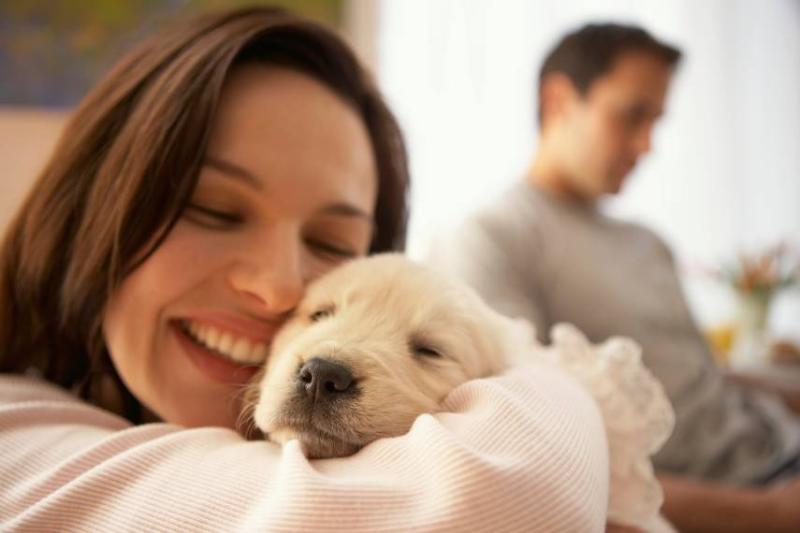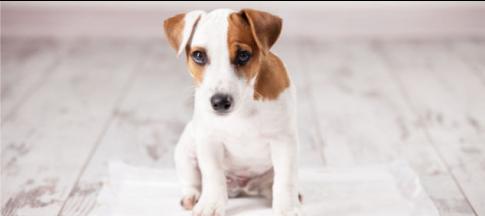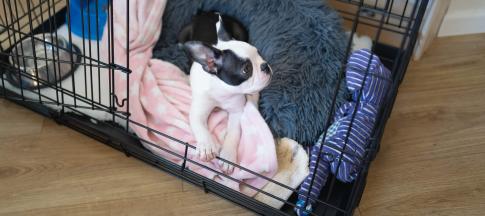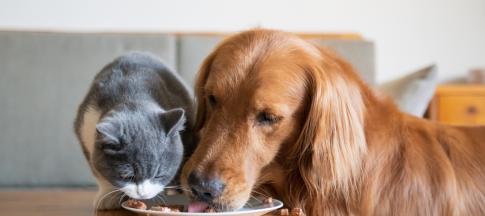
Bringing home a puppy is an exciting life event, but before you get carried away with breeds and accessories, it’s important to first consider the responsibilities and costs.
You also need to make sure to choose the right puppy for you, from a reliable source and familiarise yourself with the basics of dog care in advance.
Below, our guide for new puppy owners will help you and your new bestie settle in.
How to look after a new puppy: the first steps
Finding a puppy
The most important decision you’ll make is where to get your new puppy from.
Unfortunately, intensive puppy production has become a lucrative business with profits put before welfare. These puppies will often end up sick or traumatised, and sadly many don’t survive into adulthood.
The Kennel Club’s Assured Breeder Scheme is a good place to find a responsible dog breeder. You could also ask for recommendations from local vets and dog trainers.
Once you’ve chosen a breeder, arrange a time to visit them and any puppies they have. The Kennel Club have a comprehensive list of questions to ask before and during your visit.
Some red flags to look out for:
- The mum isn’t there or you’re told that you can’t see her
- They won’t show you where they keep their dogs
- The puppy is being sold for a suspiciously low price
- You feel pushed to a deal
- They don’t seem interested in finding out more about you
Alternatively, rescue centres often take in unwanted and abandoned puppies, so you might find what you’re looking for there. It can be very rewarding to give a second chance to a previously unloved dog.
Before you bring your puppy home
Before you bring your puppy home, it’s time to go shopping so that you have everything you need straight away. The basics include:
- A cosy bed or dog crate to sleep in
- Food and water bowls
- Supply of puppy food (preferably what they’re used to eating)
- Collar with an ID tag displaying the owner’s name and address (this is a legal requirement)
- Lead and harness
- A safe way to transport your puppy, such as a car crate
- Puppy-safe dog toys and chews
- Toilet training pads
- Poo bags
- A soft brush for grooming
It’s a good idea to get everything prepared for your puppy’s arrival ahead of time, and this includes dog-proofing your home and garden.
This mainly consists of removing any hazards and keeping valuables out of the way. Baby gates are useful to prevent your pup from entering areas of the home they shouldn’t.
Bringing your puppy home
As soon as you arrive home, take your puppy out to the spot that you want them to use as a toilet and allow them to have a sniff around.
Give your puppy space to settle in at home and wait for them to come to you for affection. It can be tempting to invite lots of people to meet your new addition straight away, but a puppy can become overwhelmed by too many new faces all at once.
Puppy potty training
There’s no hurry and rushing the process could result in your puppy becoming nervous or fearful.
Let them get used to their new surroundings and praise them if they go to the toilet. Puppies only have small bladders so need to go to the toilet more often than adult dogs.
Take your puppy out every couple of hours during the day to relieve themselves, as well as after they’ve eaten and woken up.
Accidents in the home are inevitable while a young dog is still learning. Never shout at your dog if this happens – just clean up calmly with an ammonia-free cleaning product.
How to look after your puppy once it’s home
Socialisation and habituation
Socialisation is the process of getting a dog used to people, animals and social groups. Habituation is the process of getting used to all the things a puppy will encounter in everyday life: traffic, household sounds, handling, grooming, etc.
Puppies have just a few weeks before they become fearful of new experiences, so use this time wisely to expose them to as much as you can. Puppies also thrive on routine, so establish one from the beginning to help your puppy.
If your puppy will spend some time home alone, avoid potential separation anxiety by separating yourself from your puppy while you’re still in the house. Then you can gradually increase the amount of time you’re out of sight. Stuffed KONGs, lick mats or chew toys are a good way of distracting a dog when you’re not at home.
Feeding
Ask your puppy’s breeder what food your puppy has been eating and continue using the same brand. This reduces the likelihood of them getting an upset stomach.
Puppies need diets that cater for their nutritional needs while they’re growing. If you want to change your puppy’s food, ask your vet first for their advice.
Healthcare
Take your new puppy to the vet as soon as you can after you've brought them home, even if they’ve been checked before. This is also an important part of socialisation which makes them less likely to fear visits in the future.
Your vet can identify any health issues and advise you on neutering, parasite treatment and vaccinations, as well as check their microchip (if they have one).
You should also consider insuring your new puppy as vet fees can get expensive.
Training
Training helps your puppy become a good canine citizen and help you bond with your pet.
Use positive reward-based training to get the best results and avoid punishing them for doing things wrong.
Ask your vet or local dog owners about puppy training classes near to you. This will offer the basics and a great place meet like-minded dog owners.
Keep your paw pal safe
With a bit of preparation and a gentle approach your puppy will settle into their new home and you can enjoy many happy years together.
I’ve spent 20 years writing about pets and exploring the wonderful relationships they have with their owners. I started as a staff writer on Dogs Today magazine, working my way up to become deputy editor in 2008. In 2010, I left the office to pursue a freelance career, relocated to north Norfolk and started a family.
Over the years I’ve contributed thoughtful human-interest features, celebrity interviews and investigative news stories to publications including The Sunday Times, Dogs Today, Dogs Monthly and Your Cat. I’ve also ghost-written veterinary books and press releases for the pet industry.
When I’m not writing, I enjoy long walks in the Norfolk countryside with my rescue lurcher Popsie. These are always followed by tea and cake.




